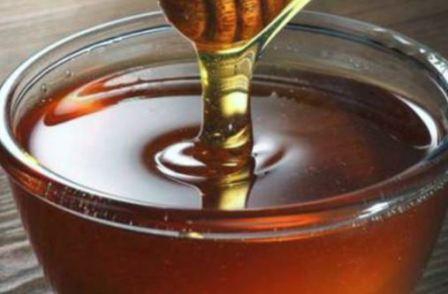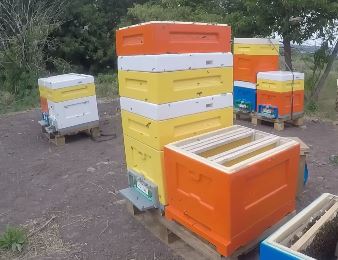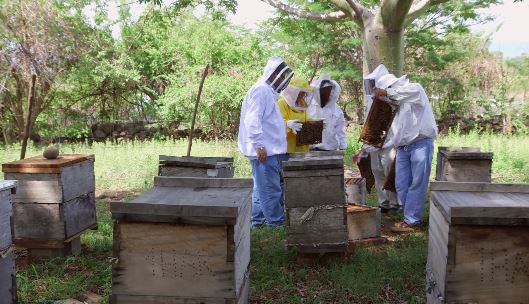All about bees and beekeeping
- Details
- Category: Beekeeping in the countries of the world
- Hits: 12310

Welcome to the site "Hive - all about bees and beekeeping", which is dedicated to bees, beekeeping, and bee products. The site contains materials on a variety of beekeeping topics.
This site will be of interest primarily to novice beekeepers, as well as lovers of honey and bee products.
Bee honey and bee products

Bees are the most important insects that have been domesticated by people. It can be said that the silkworm, as well as bumblebees, osmia bees, alfalfa bees and some other insects have also been domesticated by people. But only bees produce honey, as well as such bee products as pollen, bee bread, beeswax, royal jelly, drone homogenate, propolis, bee venom, wax moth, bee bodies, even healing air from hives. Only honey bees can provide all this. But most importantly, bees are excellent pollinators that provide humanity with food, and in the wild, a wealth of plant species.
Acacia honey or white acacia honey
Acacia honey contraindications
Medicinal properties of acacia honey
Honey with bee bread or honey with pollen
How to take bee bread and in what dosages
How to store bee bread at home
Bee bread contraindications for use
Honey plants for bees

Bees, producing honey and other bee products, visit plants. Different plants give bees nectar, honeydew, pollen, propolis. It is important for beekeepers to know from which plants bees can collect food and the substances they need, and which plants are dangerous for bees. This knowledge is even more interesting because each plant grows in its own ecosystem. Plants grow in forests, meadows, steppes, deserts, swamps, along river banks, in cities. And these plants can be useful or dangerous for bees.
Alfalfa, Alfalfa yellow honey plant
Phacelia as a honey plant sown specifically for bees
Clover white, pink, red like a honey plant
Canadian goldenrod as a honey plant
How to organize blackberry pollination by bees
Snowdrop honey plant in early spring
Thyme as a honey plant and thyme honey
Sainfoin as a honey plant for bees
Mentha honey plant useful for bees
Tips for the beekeepers

Bees are amazing insects, which are always interesting to watch as they collect nectar on flowers or carry pollen to their hive. But in order for a beekeeper to be able to collect honey and keep his bees healthy, he needs to know a lot about bees. Know how both a bee and a bee family are arranged, how to care for bees, fight diseases and enemies of bees, and much more.
How to fight a woodpecker in an apiary How to protect bees from protein starvation Kandy with soy flour recipes for feeding bees How to collect honeydew honey or how to organize the collection of honeydew honey in an apiary The first spring flight of bees How to lower a cluster of bees down in the fall Types of queen cells or how swarm queen cells differ from fistulous queen cells or quiet change The composition of the bee colony and how the bee colony works in the hive Tits in the apiary - protecting bees from tits How to get rid of a mouse in a hive and apiary How to deal with ants in an apiary How to make a hornet trap with your own hands How to make whey syrup for bees Protein spring feeding for bees cooking recipes Why bees throwing brood out of the hive How to extract heather honey without the hassle Why is water important for bees or why do bees drink water? Reducing the bees' nest in spring Is it necessary to cover the screened bоttоm board of the hive in winter? How to help the bees in the heat
Beekeeping in the world

Bees are such useful insects that when people explored new territories, they took their bees with them. That is why bees currently occupy all continents except Antarctica. Beekeeping is practiced in the scorching sandy deserts of the Arabian Peninsula and Africa, in the mountains of the Caucasus and the Alps, in the jungles of Southeast Asia and South America, in the temperate forests of North America and Europe, in agricultural landscapes around the world, and also in megacities. Despite the fact that beekeeping in different countries can differ dramatically, beekeeping news from different countries is not only interesting, but also useful. You can always learn something new that can be modified for your type of hive, climate, bees and applied in your apiary.